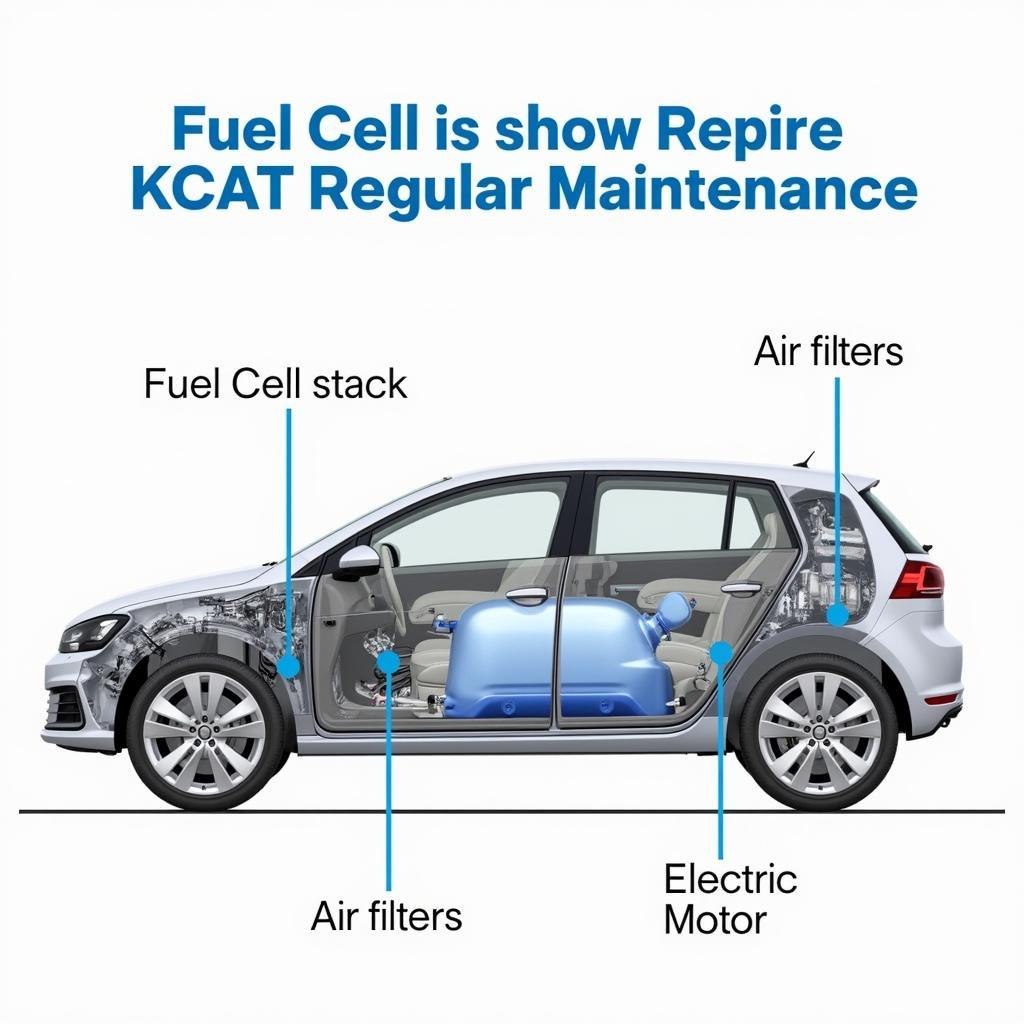Fuel Cell Car Maintenance is a crucial aspect of owning this innovative technology. While these vehicles offer numerous benefits, understanding their unique maintenance requirements is essential for optimal performance and longevity. This guide dives deep into the world of fuel cell car maintenance, offering valuable insights for owners, mechanics, and technicians alike.
 Fuel Cell Car Maintenance Overview
Fuel Cell Car Maintenance Overview
One of the most common questions surrounding fuel cell vehicles is their maintenance cost. For those considering the Hyundai Nexo, a popular fuel cell SUV, understanding the associated costs is key. Check out this helpful resource: what is cost for maintenance on nexo fuel cell car.
Key Components and Their Maintenance
The Fuel Cell Stack: The Heart of the Matter
The fuel cell stack is the core component of a fuel cell vehicle, converting hydrogen and oxygen into electricity. Regular checks for leaks, contamination, and proper humidity levels are crucial. Performance degradation can occur over time, requiring specialized technicians for diagnosis and repair.
What is the lifespan of a fuel cell stack? Typically, fuel cell stacks are designed to last for the lifespan of the vehicle, although performance may decline over time.
The Hydrogen Storage Tank: Safe and Secure
Fuel cell vehicles store hydrogen under high pressure, requiring specialized tanks designed for safety and durability. Regular inspections are mandatory to ensure the integrity of the tank and prevent leaks. The tank’s pressure relief devices should also be checked periodically.
How often should the hydrogen tank be inspected? Inspections are typically recommended every few years or as specified by the manufacturer.
Regular Maintenance Procedures for Fuel Cell Cars
Maintaining a fuel cell car involves both routine checks and specialized procedures. Air filters need regular replacement to ensure optimal airflow to the fuel cell stack. Coolant system maintenance is essential for regulating the temperature of the fuel cell. Regular software updates are also crucial for optimizing performance and addressing potential issues. For those looking for low-maintenance SUVs, you might be surprised to learn that fuel cell SUVs can be a great option. Learn more about best suv car with low maintenance.
Diagnosing and Troubleshooting Fuel Cell Car Issues
Identifying problems in a fuel cell car requires specialized diagnostic tools and expertise. Error codes and sensor data can provide valuable insights into the system’s health. Technicians trained in fuel cell technology are best equipped to handle these complex systems.
What are the common warning signs of a fuel cell system malfunction? Warning lights on the dashboard, reduced power output, or unusual noises can indicate potential issues.
“Regular maintenance is not just about keeping your fuel cell car running smoothly; it’s about ensuring its longevity and safety,” says Dr. Emily Carter, a leading expert in fuel cell technology.
The Future of Fuel Cell Car Maintenance
As fuel cell technology evolves, so will its maintenance requirements. Predictive maintenance using data analytics and remote diagnostics will play an increasingly important role in minimizing downtime and optimizing performance.
“The future of fuel cell car maintenance is about proactive measures, using data and technology to anticipate problems before they arise,” adds Dr. Carter. If you’re in Bedford, OH and looking for reliable car maintenance services, be sure to check out car maintenance bedford oh. Similarly, if you’re near St. Louis, you can find excellent options for car maintenance near st louis.
Conclusion
Fuel cell car maintenance is an evolving field, requiring specialized knowledge and tools. By understanding the key components and adhering to recommended maintenance procedures, owners can ensure optimal performance, longevity, and safety. For those looking for great deals on car maintenance, keep an eye out for black friday car maintenance deals. Remember, regular fuel cell car maintenance is an investment in the future of your vehicle.
Contact AutoTipPro at +1 (641) 206-8880 or visit our office at 500 N St Mary’s St, San Antonio, TX 78205, United States for all your fuel cell car maintenance needs.





Leave a Reply